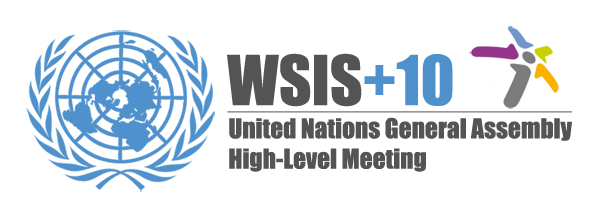On the sidelines of the World Summit on the Information Society Review (WSIS+10), participants discussed the role that information and communication technologies (ICTs) can play in achieving sustainable development, and how data and analytics can support implementation of the 2030 Agenda for Sustainable Development.
 16 December 2015: On the sidelines of the World Summit on the Information Society Review (WSIS+10), participants discussed the role that information and communication technologies (ICTs) can play in achieving sustainable development, and how data and analytics can support implementation of the 2030 Agenda for Sustainable Development.
16 December 2015: On the sidelines of the World Summit on the Information Society Review (WSIS+10), participants discussed the role that information and communication technologies (ICTs) can play in achieving sustainable development, and how data and analytics can support implementation of the 2030 Agenda for Sustainable Development.
The side event, titled ‘Towards 2030: Sustainable Development in a Digital World,’ was organized by the Permanent Mission of Ireland, the International Telecommunication Union (ITU), UN Global Pulse, the UN Conference on Trade and Development (UNCTAD) and Google. It took place on 16 December 2015, in New York, US.
David Donoghue, Permanent Representative of Ireland and former co-facilitator of the post-2015 intergovernmental negotiations, said agreements reached in 2015 at the international level, such as the Addis Ababa Action Agenda (AAAA), the 2030 Agenda, the Paris Agreement and the WSIS review, are four “landmark agreements that put us on the path for the next 15 years.” He noted that these outcomes all seek to build people-centered and inclusive societies based on sustainable development, and called for a close alignment between WSIS and the 2030 Agenda. He later said there are “major deficiencies” in terms of data access in some developing countries, noting the need to make rapid progress in these countries so as to monitor the implementation of the 2030 Agenda.
Gary Fowlie, ITU, said all four agreements include references to ICTs, and called for education to ensure digital literacy. Torbjörn Fredriksson, UNCTAD, said ICTs can influence all of the Sustainable Development Goals (SDGs), and are a means of implementation for the Goals.
Anoush Tatevossian, UN Global Pulse, suggested thinking “not only about technologies” but also about how the data revolution can help achieve the SDGs. She highlighted how big data can help achieve the SDGs, giving examples of successful implementation such as the use of data derived from mobile phone activity to map poverty, and the use of text analytics to understanding barriers to education in Uganda.
Ross LaJeunesse, Google, reported that four billion people do not have access to the internet, and 2.3 billion of these do not have a reliable source of power. He outlined the importance of considering local needs and relevance when developing ICT products. He called for capacity building on ICTs, including the most basic skills.
Experts also highlighted ICTs challenges, including: the digital divide and the lack of capabilities of local ICT sectors in some developing countries; unequal access to and varying affordability of ICTs; lack of regulations to protect internet users; and barriers related to the use of big data, such as their analytical complexity.
WSIS+10 took place on 15-16 December 2015, in New York, US. [WSIS+10 High-Level Meetings and Parallel Events] [WSIS+10 Website] [IISD RS Sources]